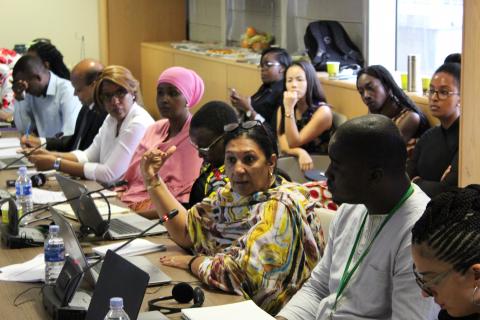
On 24 January 2020, a capitalization workshop on gender mainstreaming was co-organized at the African Development Bank (AfDB or “the Bank”) Headquarters in Abidjan by Independent Development Evaluation (IDEV) and the Bank’s Gender, Women and Civil Society Department. It aimed to share the knowledge gained from the recent Evaluation Synthesis of Gender Mainstreaming at the AfDB with gender practitioners and champions at the Bank so as to invoke discourse on the implications for the new Bank Gender Strategy currently being developed.
The Evaluation Synthesis covers the period 2010-2018. It is a follow up to the previous synthesis of gender mainstreaming undertaken by IDEV in 2012. The purpose of the evaluation is to provide evidence to the AfDB’s Board of Directors and to the Gender Department to inform the development of the Bank’s new Gender Strategy, in particular, within the framework of the AfDB’s Development and Business Delivery Model and in alignment with the Bank’s High 5 priority areas.
Since the launch of the first Gender Strategy by the AfDB in 2001, there has been some progress in gender mainstreaming at the Bank, especially with the creation of the Gender Department in 2017.
The half day workshop was opened by Vanessa Moungar, Director of the Gender Department, who commended the timeliness of the evaluation, and Roland Michelitsch, IDEV Evaluator General, who stressed that “we need more male champions for gender, otherwise the mainstreaming efforts are going to fail”. Gender is generally perceived as a ‘women’s issue’ at the Bank.
More than 45 Bank staff from various divisions and backgrounds, including from the Bank’s country and regional offices (connecting through video conference), shared their insights about the evaluation’s findings and lessons based on their experience, and at the same time, they identified which aspects are important for the next Gender Strategy of the Bank.
The presentation of the evaluation synthesis acted as a catalyst for intense discussions, especially on the four Pillars that it had proposed for the new Gender Strategy: (1) Access to Finance and Productive Resources for Economic Empowerment; (2) Human Capital for Meaningful Participation to Exercise Voice and Rights; (3) Enabling Environment for Equitable and Inclusive Growth; and (4) Learning and Knowledge Management.
Participants suggested to be selective and merge some of the pillars, to focus on pillars where the Bank would be able to intervene based on its mandate and its resources - human and financial. Other points highlighted by participants include more commitment and accountability by the Bank’s senior management and staff; more resources, especially financial and human resources; reporting on results: ‘What gets measured gets done’; the need to capitalize on good actions already implemented; structure and ownership of the new strategy; and collaboration with other departments in the Bank as well as with partners outside the Bank.
The conversation was passionate with many questions raised. The Gender Department pledged to continue the conversation through extensive consultations both internally and externally to develop a realistic new Gender Strategy for the Bank.
In conclusion, participants agreed that gender mainstreaming should not only be the responsibility of the Gender Department. As Vanessa Moungar pointed out: “we need internal buy-in and personal commitment.”

